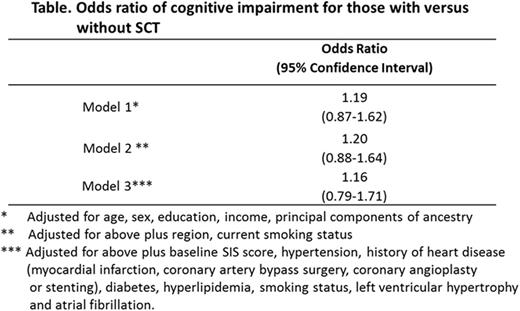Abstract
Background:Sickle cell anemia (SCA) has been associated with cognitive dysfunction, perhaps in part due to vascular occlusive disease. Increasing evidence suggests that some complications of SCA might also affect those with sickle cell trait (SCT), including chronic and end-stage kidney disease and venous thromboembolism. Thus, SCT may not be a benign condition. Based on data that SCA may influence cognition, we hypothesized that SCT is a risk factor for cognitive impairment in African-Americans.
Methods: Participants were African-American adults aged 45 and older from a national prospective cohort study of 30,239 white and black Americans; the Reasons for Geographic and Racial Differences in Stroke (REGARDS) study. The study collected extensive baseline risk factor data, and conducted baseline and annual cognitive function testing using the Six-Item Screener (SIS), a validated telephone-administered instrument for global cognitive function that yields a score from 0 to 6. Participants included in this analysis were African-Americans without SCA who had available data on baseline and at least one follow up SIS, SCT genotyping and principal components of ancestry. Participants with baseline SIS ≤4 were excluded as having prevalent impairment. Incident cognitive impairment was defined as having a score at the most recent assessment of ≤4. Logistic regression was used to model associations of SCT with incident cognitive impairment, adjusted for risk factors (listed in table footnote).
Results:Among 5,507 participants (mean age 63.5), 731 developed incident cognitive impairment with average follow up of 8.1 years. Those with incident cognitive impairment were more likely to be male with prebaseline history of cardiovascular diseases, diabetes, hypertension and dyslipidemia, and had lower income and education. They were slightly more likely to have SCT (7.9% vs 7.3%). In sequentially adjusted models (table), there was no association of SCT with incident cognitive impairment, with a fully adjusted odds ratio of 1.16 (95% CI 0.79-1.71). There were no significant differences in this odds ratio by age, diabetes, hypertension, dyslipidemia, cardiovascular disease, kidney disease or smoking status (p for interaction with SCT all >0.4).
Conclusion:In this prospectively followed general population cohort of middle-aged and older adults with longitudinal cognitive function testing, SCT was not associated with increased risk of incident cognitive impairment overall or in various high-risk subgroups. These findings suggest that unlike in SCA, SCT does not result in chronic cerebrovascular dysfunction. To confirm and extend these findings, further work is needed on associations of SCT with specific domains of cognitive function.
No relevant conflicts of interest to declare.
Author notes
Asterisk with author names denotes non-ASH members.


This feature is available to Subscribers Only
Sign In or Create an Account Close Modal